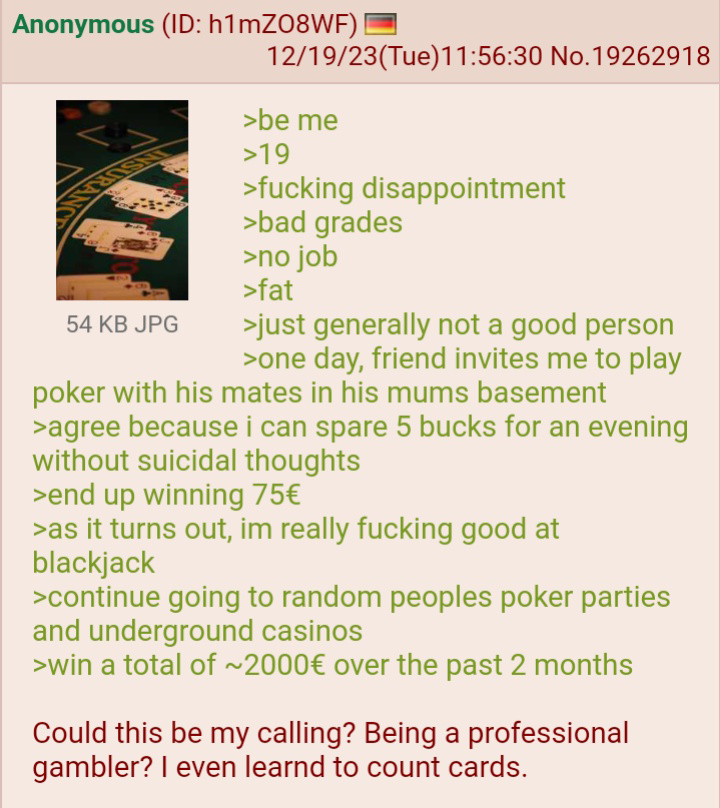this post was submitted on 07 Jan 2024
443 points (94.0% liked)
Greentext
4717 readers
1807 users here now
This is a place to share greentexts and witness the confounding life of Anon. If you're new to the Greentext community, think of it as a sort of zoo with Anon as the main attraction.
Be warned:
- Anon is often crazy.
- Anon is often depressed.
- Anon frequently shares thoughts that are immature, offensive, or incomprehensible.
If you find yourself getting angry (or god forbid, agreeing) with something Anon has said, you might be doing it wrong.
founded 1 year ago
MODERATORS
you are viewing a single comment's thread
view the rest of the comments
view the rest of the comments

Because you would need to be a class 9 sperd to capitalize on the odd differential.
Not really. Counting cards is easy.
2-6 = +1
7-9 = 0
10-Ace= -1
Bet more when the running total is positive.
I'm too dumb to know if this is smart, can you expand on this?
There's a couple of Modern Rogue (RIP) episodes that explain this pretty well.
First thing you need to know about a proper game of blackjack: the players at the table aren't in competition with each other, they're all playing their own games of blackjack against the dealer. It's possible for everyone to win, everyone to lose, or some combination thereof. Second thing you need to know: the dealer is not allowed to make any decisions or judgement calls; the dealer must follow a set algorithm for how the house's hand is played.
So because the dealer's behavior is algorithmic, there is also an algorithm for players to follow that will cause players to lose least often. Not necessarily win most often, because the rules are tilted in the house's favor, the house will win eventually, but...if you show up with $10 in your pocket, sticking to the ideal play algorithm will allow you to lose it as slow as possible.
What counting cards does is maybe inform you about when it's better to deviate from ideal play, but also when to bet minimum and when to bet higher. If you happen to know there are more low-value cards in the deck because several of them have already been played, you know the dealer is more likely to bust, so the odds are in your favor. You don't have to keep like a running tally of each individual card in your head, you can simplify it by keeping track of one integer number, called the "count."
When the dealer shuffles the deck, start the count at zero. When you see a card in your own hand, in another player's hand, or the dealer's hand that is:
a 2 through 6: add one to your count.
a 7, 8 or 9, add nothing to your count.
A 10, Jack, Queen, King or Ace: subtract one from your count.
When the count is positive, the dealer is more likely to hit until he busts, meaning the player is more likely to win his hand. So possibly don't hit at all, don't risk it and let the dealer step on that landmine, or even if you do, bet more than the minimum bet.
If the count is zero or positive, the dealer will likely win the hand, so stick to ideal play and bet minimum.
If they suspect you're doing this, because you're winning too much, they may ask you to leave the table or leave the casino. To prevent this, the dealer may burn a card each hand to deny the players some info, and not deal to the end of the deck, as counting cards gives you more information toward the end of the deck. Higher stakes tables probably use multiple decks of cards at once to render card counting useless.
Thanks! Great explanation!